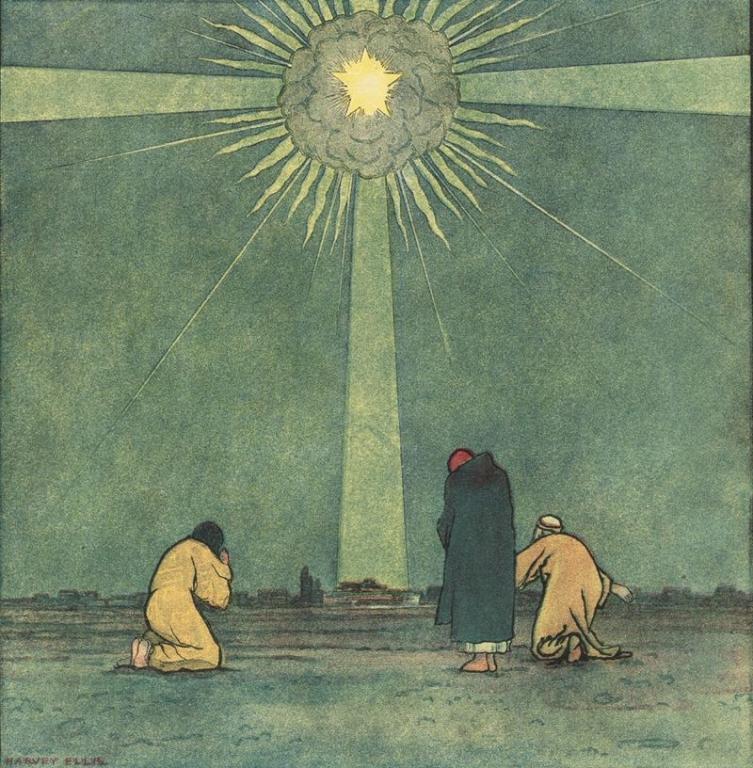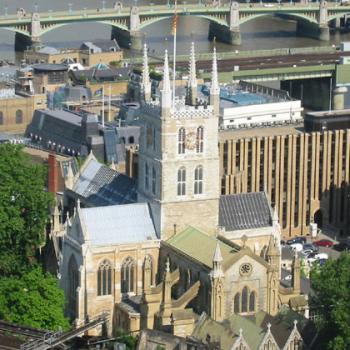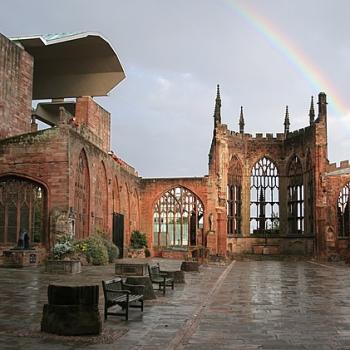
(Wikimedia Commons public domain image)
For the past several years, Jeri Covey and her husband, Stephen M. R. Covey, have invited us to the annual Christmas dinner and musical event that they put on at their home. We were there again last night. For this year, along with a wonderful spread of food, they had a BYU faculty/staff male quartet that performed together and individually, along with superb pianists, a violin soloist, a chamber orchestra of (I think) BYU students, and at least one other really fine male soloist. The music ranged from spirituals to Schubert to John Rutter to fun carols. They finished with a rousing version of “O, Holy Night”; the most stirring portion of the song for me has always been
Truly He taught us to love one another;
His law is Love and His gospel is Peace;
Chains shall he break, for the slave is our brother,
And in his name all oppression shall cease.
And then we closed by all rising and joining in Handel’s incomparable “Hallelujah Chorus.” I’m so very grateful that we’ve been included in these marvelous evening.
My own personal traditional Christmas is an amalgam mostly of English and German elements. (The Christmas tree, the music — including the German-born Handel’s English-born oratorio Messiah — the holly and the ivy, Charles Dickens, and so forth.) That’s true for many Americans, of course. But mine may be a tad more Germanic than most. When I envision a perfect Christmas setting, I think of small Bavarian, Swiss, or Austrian chapels in snowy meadows under a cold, clear, starry night sky, surrounded by white Alpine peaks. (I once spent precisely such an evening with a Latter-day Saint family in the village of Innertkirchen, in the area of the Berner Oberland called Haslital.) I’m especially fond of German and Austrian carols, and the season of Christmas and New Year will not fully pass before we have a dinner of Swiss fondue, a dinner of what the Germans tend to call Rouladen and the Swiss that I’ve known call Fleischvögel, and a dinner of Swiss raclette. (I would really, really, really like to have a batch of Norwegian potato lefse, too. But the making of it is so very messy and labor intensive that, for my wife, lefse is simply and sadly a bridge too far.)
One of my favorite Austrian Christmas carols is “Still, Still, Still,” which apparently comes from the area of Salzburg. I like it in almost any form, but one of the ways in which I became familiar with it was in a recording by the late Peter Alexander. Some will perhaps dismiss it as kitschy, but it still affects me powerfully:
I remember very clearly when and where the marvelous carol “Es ist ein Ros entsprungen” (often called in English “Lo, How a Rose E’er Blooming”), which was given its classical form by the German composer Michael Praetorius in 1609 but which originated sometime before that, first hit me. (I suppose that I had perhaps heard the carol before, but, if I had, it hadn’t registered. Not even slightly.) I was attending a Latter-day Saint sacrament meeting in Interlaken, Switzerland, shortly before Christmas 1973. Curiously, I don’t recall who sang it. It may have been a branch or district choir.
I was enraptured. Riveted. I had seldom heard anything so beautiful. And it still affects me that way.
Es ist ein Ros entsprungen,
aus einer Wurzel zart,
wie uns die Alten sungen,
von Jesse kam die Art.
Und hat ein Blümlein bracht
mitten im kalten Winter,
wohl zu der halben Nacht.
Das Röslein, das ich meine,
davon Isaias sagt,
hat uns gebracht alleine
Marie, die reine Magd.
Aus Gottes ew’gem Rat
hat sie ein Kind geboren
wohl zu der halben Nacht.
Das Blümelein, so kleine,
das duftet uns so süß,
mit seinem hellen Scheine
vertreibt’s die Finsternis.
Wahr Mensch und wahrer Gott
hilft uns aus allem Leide,
rettet von Sünd und Tod.
Here’s a literal and quite unpoetic translation (partially my own):
A rose has sprung up,
from a tender root,
As the ancients sang to us.
Its line came from Jesse
And it has brought forth a small flower
In the middle of the cold winter,
In the middle of the night.
The little rose that I mean,
Of which Isaiah told,
Mary alone, the pure maid,
Has brought to us.
By God’s eternal counsel
She has borne a child
In the middle of the night.
The tiny flower, so small,
That smells so sweet to us,
With its bright gleam
Dispels the darkness
–True man and true God–
Helps us from all suffering,
Saves us from sin and death.
I’ve always loved the German lyrics. (The English words just don’t move me as much — and not merely in the literal and unpoetic version supplied above. But the music is gorgeous in any language. Here’s one rendition that I like:
As far as the English elements go, it’s probably an appropriate time for me to share with you a favorite poem by Sir John Betjeman, who served as poet laureate of England from 1972 until his death in 1984:
The Tortoise stove is lit again
And lamp-oil light across the night
Has caught the streaks of winter rain
In many a stained-glass window sheen
From Crimson Lake to Hookers Green.The holly in the windy hedge
And round the Manor House the yew
Will soon be stripped to deck the ledge,
The altar, font and arch and pew,
So that the villagers can say
‘The church looks nice’ on Christmas Day.Provincial Public Houses blaze,
Corporation tramcars clang,
On lighted tenements I gaze,
Where paper decorations hang,
And bunting in the red Town Hall
Says ‘Merry Christmas to you all’.And London shops on Christmas Eve
Are strung with silver bells and flowers
As hurrying clerks the City leave
To pigeon-haunted classic towers,
And marbled clouds go scudding by
The many-steepled London sky.And girls in slacks remember Dad,
And oafish louts remember Mum,
And sleepless children’s hearts are glad.
And Christmas-morning bells say ‘Come!’
Even to shining ones who dwell
Safe in the Dorchester Hotel.And is it true,
This most tremendous tale of all,
Seen in a stained-glass window’s hue,
A Baby in an ox’s stall ?
The Maker of the stars and sea
Become a Child on earth for me ?And is it true? For if it is,
No loving fingers tying strings
Around those tissued fripperies,
The sweet and silly Christmas things,
Bath salts and inexpensive scent
And hideous tie so kindly meant,No love that in a family dwells,
No carolling in frosty air,
Nor all the steeple-shaking bells
Can with this single Truth compare –
That God was man in Palestine
And lives today in Bread and Wine.












